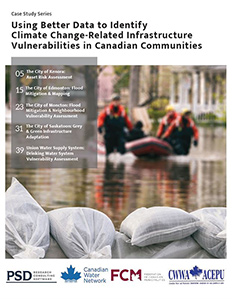Using better data to identify climate change-related infrastructure vulnerabilities in Canadian communities
PSD, Canadian Water Network, Federation of Canadian Municipalities, Canadian Water and Wastewater Association (2018-2019)

Challenge
Municipal assets and public services are vulnerable to the impacts of climate change, placing local leaders at the frontlines of risk reduction and adaptation. In many municipalities across the country, water, wastewater and stormwater infrastructure may already be in poor condition or under serviced, and temperature fluctuations, extreme precipitation and other extreme weather events associated with climate change will only exacerbate these existing vulnerabilities.
Asset management plans support municipalities and utilities in defining and maintaining levels of service, identifying and minimizing lifecycle costs, and planning ahead for asset replacement and expansion. Strong asset management programs are therefore critical to supporting financial sustainability and helping to address funding shortfalls due to historic underinvestment in infrastructure maintenance. Having a clearer picture of municipal water systems is also increasingly seen as an opportunity to improve system resiliency to climate change.
In 2017, Canadian Water Network partnered with PSD and the Canadian Water and Wastewater Association to research what asset data is being collected by Canadian municipalities and utilities and how it is being used to support water infrastructure planning. The survey found that both large and small municipalities are increasingly employing asset management practices, but that they are not regularly updated, and are largely populated with subjective datasets that do not give an accurate assessment of asset condition, which impacts confidence in the data for decision-making.
When it comes to assessing the impacts of climate change, high quality asset information is essential to understanding infrastructure vulnerability. Additionally, creatively using unconventional data to complement traditional asset information can potentially help build a more complete picture and inform timely decision making.
Key information that utility managers need to know includes:
- What types of climate-related risks should be considered?
- What types of data are needed to help identify climate related vulnerabilities?
- What approaches are leading utilities taking in Canada to advance in this area?
Project
Canadian Water Network, in partnership with PSD, the Federation of Canadian Municipalities and the Canadian Water and Wastewater Association prepared five case studies of Canadian municipalities that were collecting and utilizing data to support infrastructure vulnerability assessment and increase resilience to climate change.
- Kenora, Ontario: Asset Risk Assessment
- EPCOR/Edmonton, Alberta: Flood Mitigation and Mapping
- Moncton, New Brunswick: Flood Mitigation and Neighbourhood Vulnerability Assessment
- Saskatoon, Saskatchewan: Grey and Green Infrastructure Adaptation
- Union Water Supply System, Ontario: Drinking Water System Vulnerability Assessment
Each case study was developed through detailed interviews with utility staff. They provide an overview of potential impacts and each utility’s unique approach undertaken to adapt water, wastewater, stormwater and other infrastructure. The report describes how data were collected and analyzed to inform decision-making and how the utility overcame any initial challenges to implementation. At the end of each case study, a road map help guides other municipalities/utilities.
Outputs
- Download the case studies: Using Better Data to Identify Climate Change-Related Infrastructure Vulnerabilities in Canadian Communities
- PSD will host a national webinar on November 13th at 1:00 p.m. EST. Join us for an insightful panel discussion to learn how to use these case studies as a road map for municipal adaptation.Elaine Aucoin, Director, Environmental Planning and Management, City of Moncton
Kim Jusek, Municipal Program Manager, Canadian Water Network
Genevieve Russell, Special Project Manager, Green Infrastructure Strategy, City of Saskatoon
Angela Schmidt, Storm Water Utility Manager, City of Saskatoon
Tyler Sutton, General Manager of Research and Marketing, PSD
- An expert panel will present the case studies on November 4th at the 2019 National Water and Wastewater Conference.Susan Ancel, Director of Stormwater Strategies, EPCOR Water Services Inc.
Rodney Bouchard, General Manager, Union Water Supply System
Anissia Nasr, Capacity Development Officer, Federation of Canadian Municipalities
Kim Jusek, Municipal Program Manager, Canadian Water Network
Tyler Sutton, General Manager of Research and Marketing, PSD












